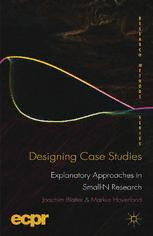
Designing Case Studies: Explanatory Approaches in Small-N Research PDF
Preview Designing Case Studies: Explanatory Approaches in Small-N Research
Designing Case Studies ResearchMethodsSeries General Editors: Bernhard Kittel, Professor of Social Science Methodology, Department of Social Sciences, Carl von Ossietzky Universität Oldenburg, Germany, and Benoît Rihoux, Professor of Political Science, Université catholiquedeLouvain(UCL),Belgium. In association with the European Consortium for Political Research (ECPR), Palgrave Macmillan is delighted to announce the launch of a new book series dedicatedtoproducingcutting-edgetitlesinResearchMethods.Whilepolitical sciencecurrentlytendstoimportmethodsdevelopedinneighboringdisciplines, the series contributes to developing a methodological apparatus focusing on those methods that are appropriate in dealing with the specific research prob- lemsofthediscipline. The series provides students and scholars with state-of-the-art scholarship on methodology, methods, and techniques. It comprises innovative and intel- lectually rigorous monographs and edited collections that bridge schools of thought and cross the boundaries of conventional approaches, covering both empirical–analyticalandinterpretiveapproaches,microandmacrostudies,and quantitativeandqualitativemethods. Titlesinclude: JoachimBlatterandMarkusHaverland DESIGNINGCASESTUDIES ExplanatoryApproachesinSmall-NResearch AlexanderBogner,BeateLittig,andWolfgangMenz(editors) INTERVIEWINGEXPERTS BernhardKittel,WolfgangJ.Luhan,andRebeccaB.Morton(editors) EXPERIMENTALPOLITICALSCIENCE PrinciplesandPractices AudieKlotzandDeepaPrakash(editors) QUALITATIVEMETHODSININTERNATIONALRELATIONS APluralistGuide LaneKenworthyandAlexanderHicks(editors) METHODANDSUBSTANCEINMACROCOMPARATIVEANALYSIS ResearchMethodsSeries SeriesStandingOrderISBN978–0230–20679–3hardcover SeriesStandingOrderISBN978–0230–20680–9paperback (outsideNorthAmericaonly) You can receive future titles in this series as they are published by placing a standing order. Please contact your bookseller or, in case of difficulty, write to usattheaddressbelowwithyournameandaddress,thetitleoftheseriesand oneoftheISBNsquotedabove. Customer Services Department, Macmillan Distribution Ltd, Houndmills, Basingstoke,HampshireRG216XS,England Designing Case Studies Explanatory Approaches in Small-N Research Joachim Blatter ProfessorofPoliticalScience,DepartmentofHumanitiesandSocialSciences, UniversityofLucerne,Switzerland and Markus Haverland ProfessorofPoliticalScience,DepartmentofPublicAdministration, ErasmusUniversityRotterdam,TheNetherlands ©JoachimBlatterandMarkusHaverland2012 Softcover reprint of the hardcover 1st edition 2012 978-0-230-24969-1 Allrightsreserved.Noreproduction,copyortransmissionofthis publicationmaybemadewithoutwrittenpermission. Noportionofthispublicationmaybereproduced,copiedortransmitted savewithwrittenpermissionorinaccordancewiththeprovisionsofthe Copyright,DesignsandPatentsAct1988,orunderthetermsofanylicence permittinglimitedcopyingissuedbytheCopyrightLicensingAgency, SaffronHouse,6–10KirbyStreet,LondonEC1N8TS. Anypersonwhodoesanyunauthorizedactinrelationtothispublication maybeliabletocriminalprosecutionandcivilclaimsfordamages. Theauthorshaveassertedtheirrightstobeidentifiedastheauthorsofthis workinaccordancewiththeCopyright,DesignsandPatentsAct1988. Firstpublished2012by PALGRAVEMACMILLAN PalgraveMacmillanintheUKisanimprintofMacmillanPublishersLimited, registeredinEngland,companynumber785998,ofHoundmills,Basingstoke, HampshireRG216XS. PalgraveMacmillanintheUSisadivisionofStMartin’sPressLLC, 175FifthAvenue,NewYork,NY10010. PalgraveMacmillanistheglobalacademicimprintoftheabovecompanies andhascompaniesandrepresentativesthroughouttheworld. Palgrave®andMacmillan®areregisteredtrademarksintheUnitedStates, theUnitedKingdom,Europeandothercountries. ISBN 978-1-349-32085-1 ISBN 978-1-137-01666-9 (eBook) DOI 10.1057/9781137016669 Thisbookisprintedonpapersuitableforrecyclingandmadefromfully managedandsustainedforestsources.Logging,pulpingandmanufacturing processesareexpectedtoconformtotheenvironmentalregulationsofthe countryoforigin. AcataloguerecordforthisbookisavailablefromtheBritishLibrary. LibraryofCongressCataloging-in-PublicationData Blatter,Joachim,1966– Designingcasestudies:explanatoryapproachesinsmall-nresearch/ JoachimBlatter,MarkusHaverland. pages cm.—(Researchmethodsseries) Includesbibliographicalreferences. 1. Politicalscience—Research—Methodology. 2. Socialsciences— Research—Methodology. 3. Casemethod. I. Haverland,M.(Markus) II. Title. JA86.B552012 320.072(cid:2)3—dc23 2012009550 10 9 8 7 6 5 4 3 2 1 21 20 19 18 17 16 15 14 13 12 We dedicate this book to Lisa as well as to Judith, Anou, and Maud This page intentionally left blank Contents ListofFiguresandTables xiii ListofAbbreviations xv PrefaceandAcknowledgements xvi 1 RelevanceandRefinementsofCaseStudies 1 1.1 Casestudiesascornerstonesfortheoriesand researchprograms 2 1.2 Thecaseforcasestudyresearch 5 1.2.1 Thegrowingrelevanceoftiming,cognition, andinterdependence 5 1.2.2 Perforatedboundariesinsocialrealityand thesocialsciences 6 1.2.3 Buildingbridgesbetweenparadigmatic camps 7 1.3 Thecaseforanon-fundamentalistandpluralist epistemology 9 1.3.1 Empiricism/PositivismandCritical Rationalism 9 1.3.2 Constructivism/Conventionalismand CriticalTheory 10 1.3.3 Pragmatism/NaturalismandCriticalRealism 12 1.3.4 Theepistemological‘middleground’: Anti-fundamentalistandpluralistic 13 1.4 Casestudymethodology:Abriefhistoryandrecent contributions 15 1.5 Casestudies:Towardagenericand multidimensionaldefinition 18 1.6 Observations:Towardanadequateunderstandingof casestudies 20 1.7 Threeapproachestocasestudyresearch: Anoverview 23 1.7.1 Researchgoalsandquestions 23 1.7.2 Caseandtheoryselection 24 vii viii Contents 1.7.3 Datagenerationanddataanalysis 26 1.7.4 Generalization 31 2 Co-VariationalAnalysis 33 2.1 Researchgoalsandresearchquestions 35 2.2 Ontologicalandepistemologicalfoundationsand affinities 36 2.2.1 Experimentaltemplateandcounterfactual conceptofcausation 37 2.2.2 Experimentalcontrolversuscontrolin observationalstudies 38 2.2.3 Probabilisticversusdeterministiccausality 38 2.2.4 Autonomousversusconfigurational causality 41 2.3 Selectingcases 41 2.3.1 Criteriaforcaseselection 42 2.3.2 Modesofcomparison 44 2.3.3 Cross-sectionalcomparison 45 2.3.4 Intertemporalcomparison 46 2.3.5 Cross-sectional–intertemporal comparison 47 2.3.6 Counterfactualcomparison 48 2.3.7 Excursus:Themethodofagreementandthe mostdifferentsystemsdesign 49 2.4 Thefunctionsofpriorknowledgeandtheory 50 2.4.1 Specifyingthemainindependentand dependentvariable 51 2.4.2 Substantiatingtheresearchhypothesis 52 2.4.3 Identifyingcontrolvariables 54 2.5 Drawingcausalinferencesforthecasesunder investigation 54 2.5.1 Datasetresultsandconclusions 55 2.5.2 Examples 58 2.5.3 Concludingremarks 61 2.6 Measurementanddatacollection 63 2.6.1 Conceptualizationandmeasurementin large-Nversussmall-Nresearch 63 2.6.2 Determinationofclassificationsandcut-off points 65 2.6.3 Replicabilityandmeasurementerror 67 2.6.4 Datatriangulation 68 Contents ix 2.7 Directionofgeneralization 68 2.8 Presentingfindingsandconclusions 70 2.9 Exampleofbestpractice:Zangl’sJudicalization Matters! 71 2.10 Summaryandconclusions 75 2.11 Appendix:Howtomakecounterfactualanalysis morecompelling 76 3 Causal-ProcessTracing 79 3.1 Researchgoalsandresearchquestions 84 3.1.1 Startingpointsandresearchgoals 84 3.1.2 Researchgoalsandfunctionsof causal-processtracing 87 3.1.3 Researchquestions 88 3.2 Ontologicalandepistemologicalfoundations 90 3.2.1 Contingency 91 3.2.2 Causalconditionsandconfigurations 92 3.2.3 Additiveandinteractiveconfigurations 93 3.2.4 Causalconjunctionsandcausalchains 94 3.2.5 Socialandcausalmechanisms 95 3.2.6 Summary 97 3.2.7 Appendix:Contexts 98 3.3 Selectingcases 99 3.3.1 Misleadingadviceandtrade-offs 99 3.3.2 Generalcriteriaforselectingcases 102 3.3.3 Specificcriteriaforselectingcasesaccording todifferentresearchgoals 102 3.4 Collectingempiricalinformation 105 3.5 Drawingcausalinferencesforthecase(s)under investigation 106 3.5.1 Theaddedvalueofcausal-process observations 107 3.5.2 Majorfeaturesofcausal-processtracing 109 3.5.3 EmpiricalfundamentsofCPT:Storylines, smokingguns,andconfessions 110 3.5.4 LogicalfoundationsofCPTI:Causalchains 119 3.5.5 LogicalfoundationsofCPTII:Process dynamics 121 3.6 Examples 123 3.6.1 Brady’sData-SetObservationsversus Causal-ProcessObservations 124
